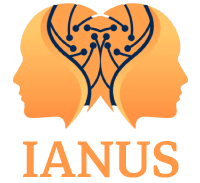Our third in-person consortium meeting took place April 23-34th at the Résidence Palace in Brussels. With the IANUS project approaching its concluding year, experts and representatives from IANUS’ partner organizations came together to align our research and action plans for the upcoming months.
The two-day meeting was aimed at fortifying trust in science through transparency, inclusivity, and societal engagement. During these two years, we mapped the landscape of projects and discourses relevant to trust in science, developing our conceptual framework. We have now started to conduct participatory research into the conditions of trust and the in-person meeting helped ensure coherence between the conceptual analysis of trust and distrust developed during IANUS’ earlier phases and the ‘action research’ that is to come.
Indeed, most of the conversation rotated around the importance of a theoretical framework able to value the complexity of trust, co-creation, and open science but also safeguard the scientific rigor in IANUS. The discussion also focused on how to enable synergies among the different WPs of the project and better connect each WP’s insights, especially when they complement each other, so as to effectively translate findings into recommendations for policy-makers, science professionals, and communicators. The ultimate goal is to go ‘from theory to practice:’ to translate IANUS’ academic insight into policy-relevant insights and connect our work to different domains of research practice and research policy.
Additionally, we discussed future publication plans and opportunities to share the knowledge produced within IANUS with stakeholders, policy-makers, and general audiences. This included IANUS’ final conference as well as future dissemination and communication events, with a mind to additional media projects to further involve audiences interested in trust in science, building an actual toolkit for informal science education.
What we have learned so far is that trust in science and science are not homogenous. Saying that trust in science is complex means acknowledging that there is no single trust and no single science. Trust consists of many different types of trust and so does science. IANUS’ structural analysis provides a basis for future empirical research within and beyond the project. Our hope is that, by the end of the project, we will provide effective tools to empower citizens and stakeholders to discern valid trust from unfounded beliefs, navigate scientific uncertainties, and participate meaningfully in research.
As we are starting our final year with the IANUS project, our dedication to fostering trust in science remains steadfast. Our General Assembly gave us the chance to reflect on the project’s overall journey, mission, and impact. Stay tuned for updates as we keep on this journey to foster warranted trust in science, research, and innovation.
